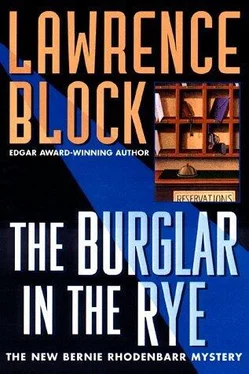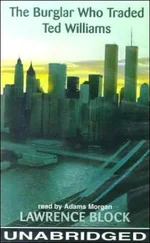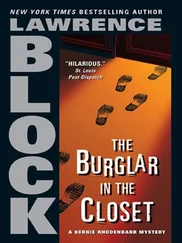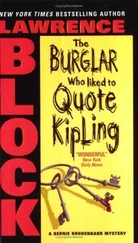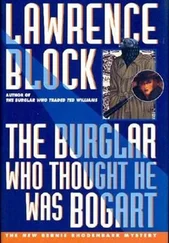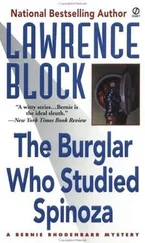“And then it was her turn. ‘Now pretend you’re the man,’ she said, and that was weird, too. I don’t even like talking about this stuff, Bern.”
“Me neither. I’ve never been much on locker-room conversations.”
“Or powder-room conversations, either. But I didn’t have any more conversations with Erica, because I fell asleep right away. I woke up early, but she was already dressed and gone, so all I woke up with was a hangover.”
“Where do you think it’s going?”
“The hangover? I think it’s going away, thanks to Two Guys from Tashkent. Oh, you mean me and Erica? I don’t know. I guess time will tell. How about you and Alice?”
“I think it’s already gone.”
“And how about Gulliver Fairborn’s letters, and those rubies you found? And the murder of Anthea Landau? And everything else that’s been going on?”
“I don’t know,” I said. “Once I realized that was Alice squealing with passion, I thought what a coincidence it was that she was in this room. But it wasn’t a coincidence at all, not if it was her room. And I thought about it some more, and I saw the real coincidence.”
“What was that?”
“The jewelry. John Considine stole it from himself and gave it to Isis.”
“On loan.”
“According to him, but either way she had it. And then it wound up in Alice Cottrell’s room. Now that’s a coincidence.”
“It wound up in your pocket,” she said, “and that’s not a coincidence. It’s theft, and maybe that’s how it got in Alice ’s room.”
“She’s a jewel thief?”
“Why not?”
“And, because she’s an accomplished thief herself, she has to rope me in to swipe some letters so she can return them to Gulliver Fairborn?”
“Maybe she’s not a jewel thief, Bern.”
“Then what is she? And how did she wind up with the jewels? And, and…”
“And what, Bern?”
“I don’t know,” I said, “but it’s getting complicated.”
In the time I was gone, Henry had made a couple of sales and settled with the woman who’d left the bag of books. He paid her in cash from the register and got her to write out a receipt, and he even saved me money; he’d offered her twenty-five dollars less than I’d been prepared to go, and she’d taken it without argument.
Mr. Harkness from Sotheby’s had called again. I didn’t feel like calling him back, nor could I see the point in trying Alice Cottrell’s number, because I’d figured out that it wasn’t her number after all. So what I did instead was stand there talking books with Henry, who leaned on my counter with his chin in his hand and talked about the impression Thomas Wolfe had made on him at an admittedly impressionable age. “I thought Look Homeward, Angel was just wonderful,” he said, “and then a few years ago I tried rereading it, and I couldn’t get anywhere with it.”
“Well, you can’t go home again,” I said.
“Maybe that’s it, although there are some books I can read over and over. But I think you have to be young when you read Wolfe.”
“It’s the same with Dr. Seuss.”
“I don’t know,” he said. “I like The Cat in the Hat better than ever. And the one about the kid with all those hats.”
“Bartholomew Cubbins,” I said. “Maybe you just like books about hats. I’ve got a copy of The Green Hat around here somewhere. By Michael Arlen. I’ve had it for years, and if you read it you can tell me if it’s any good. What about Nobody’s Baby ? If you’d read it when you were seventeen you’d be saying it changed your life, but I don’t suppose you did.”
“I was well past seventeen when it was published.”
“But you read it?”
“When it came out, and I’ve looked at it a few times since then.”
“But I don’t suppose it changed your life, did it?”
“I suppose everything does,” he said thoughtfully. “Even the morning paper, even the quiz on the back of the Special K box. One’s a different person for having read it, whatever it happens to be.”
That got us into a nice philosophical conversation. I’d bought the bookshop in the hope of conversations like this one, and I gave myself over to it wholeheartedly. I stopped in midsentence and turned at the sound of the door opening, and there was a woman who looked familiar. I couldn’t place her until she said, “Hi! What are you doing here?”
It was Isis Gauthier, and I didn’t recognize her until she spoke because she looked very different. She wasn’t dressed like Paddington Bear this time around, but looked just fine in jeans and a pink Brooks Brothers shirt. Her cornrows had transformed themselves into straight shoulder-length hair with red highlights, which, clever fellow that I am, I realized had to be a wig.
“I come here all the time,” I said. “It’s my store. What are you doing here?”
“Not you,” she said. She was looking at Henry, who straightened up, his hand dropping to his side. “Oh, sorry. I thought you were somebody else.” Now she turned to me. “I know it’s your store,” she said. “And I know what you do when you’re not running it, too. And I think we ought to have a talk.” Then she turned and looked at Henry again.
“Time I got some lunch,” Henry said diplomatically.
She was silent until the door closed behind him. Then she said she’d spoken to Marty, who told her he’d spoken to me. “He says you didn’t kill Miss Landau,” she said, “but that’s the same thing that policeman said. You went there to steal something but you couldn’t find it.”
“I hate the way that sounds,” I said. “As if I’m a crook, and incompetent in the bargain.”
I gave her my best disarming smile, but I couldn’t see that it had any effect. “You’re a burglar,” she said, “and you came to my hotel to steal something. And somebody got into my room and stole my rubies. Now it doesn’t seem like much of a leap to think you had something to do with it.”
“I see your point, but-”
“Marty says you didn’t,” she went on. “But here’s the thing, see. When I first told him my rubies were missing, I could tell he wasn’t buying it. He thought it was a way for me to keep them without flat out refusing to give them back. ‘Oh, Ah’d be happy to give dem back so poor Miz Considine don’t be pinin’ away for dem, but Ah cain’t, on account of somebody done stole dem.’”
“‘Glory be, Miz Scarlett, what do Ah know about birfin’ babies?’”
She gave me a look. “But now he believes me,” she said. “He had a conversation with you, and now he believes me. What does that tell you, Mr. Rhodenbarr?”
“I guess he came to his senses.”
“What it tells me,” she said, “is that he knew I hadn’t faked the theft of the rubies, because you admitted taking them. You must have made an earlier visit to the hotel, before the night I ran into you in the hallway.”
“And then I returned to the scene of the crime?”
“You found out the Paddington’s security wasn’t that great, and you wanted to see what some of the other rooms might hold. But what I want to know is how you came to my room in the first place. Did John Considine send you?”
“I’ve never met the man. And if I’d already stolen the rubies on his behalf, why would he send Marty to talk you out of them?”
“Maybe he didn’t know you were successful. Maybe you decided not to tell him, because you thought you could do better selling the rubies to somebody else than settling for whatever he promised you for them.”
“That’s a lot of maybes for one sentence.”
“It’s two sentences, with one maybe in each.”
Читать дальше
